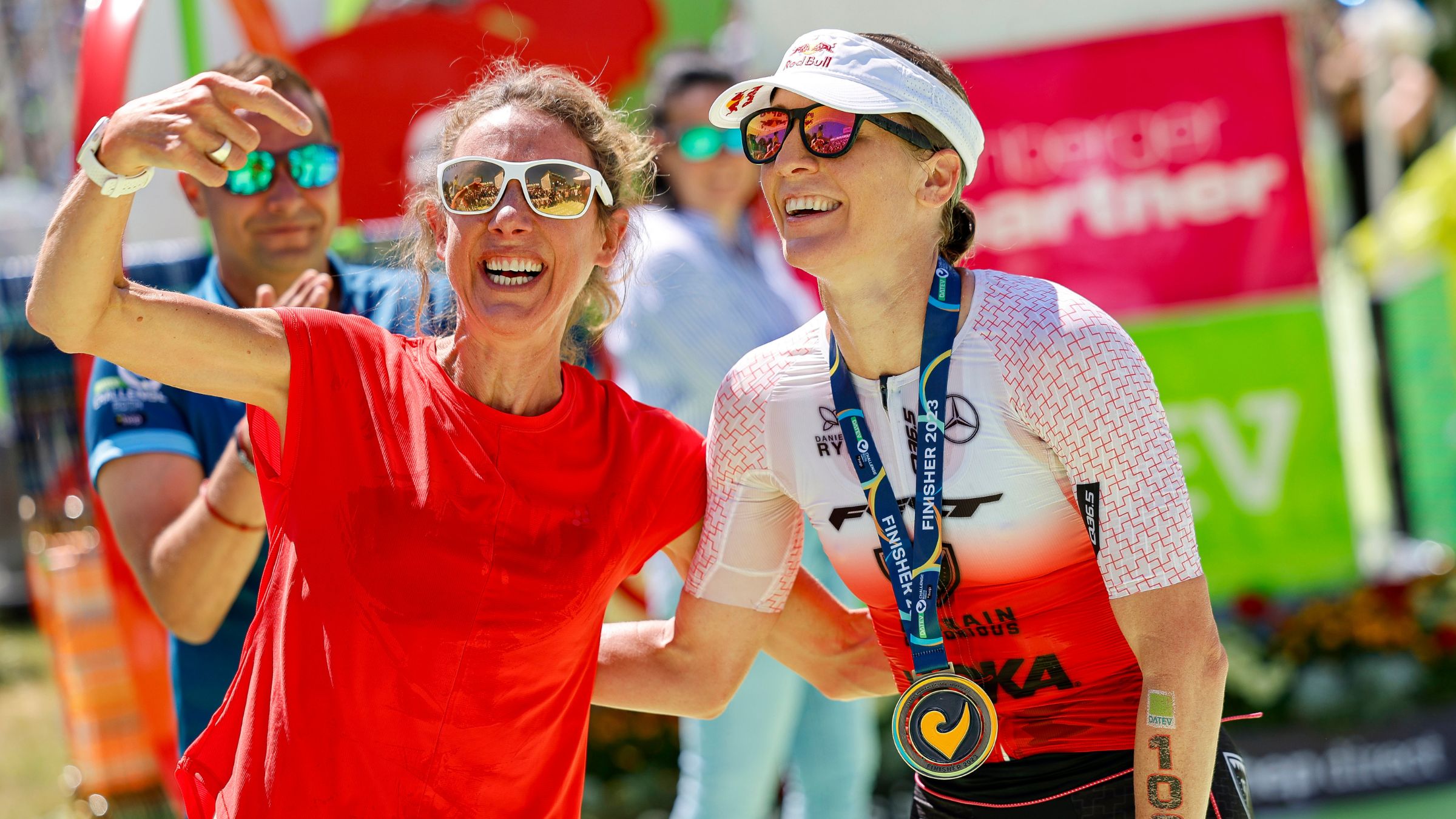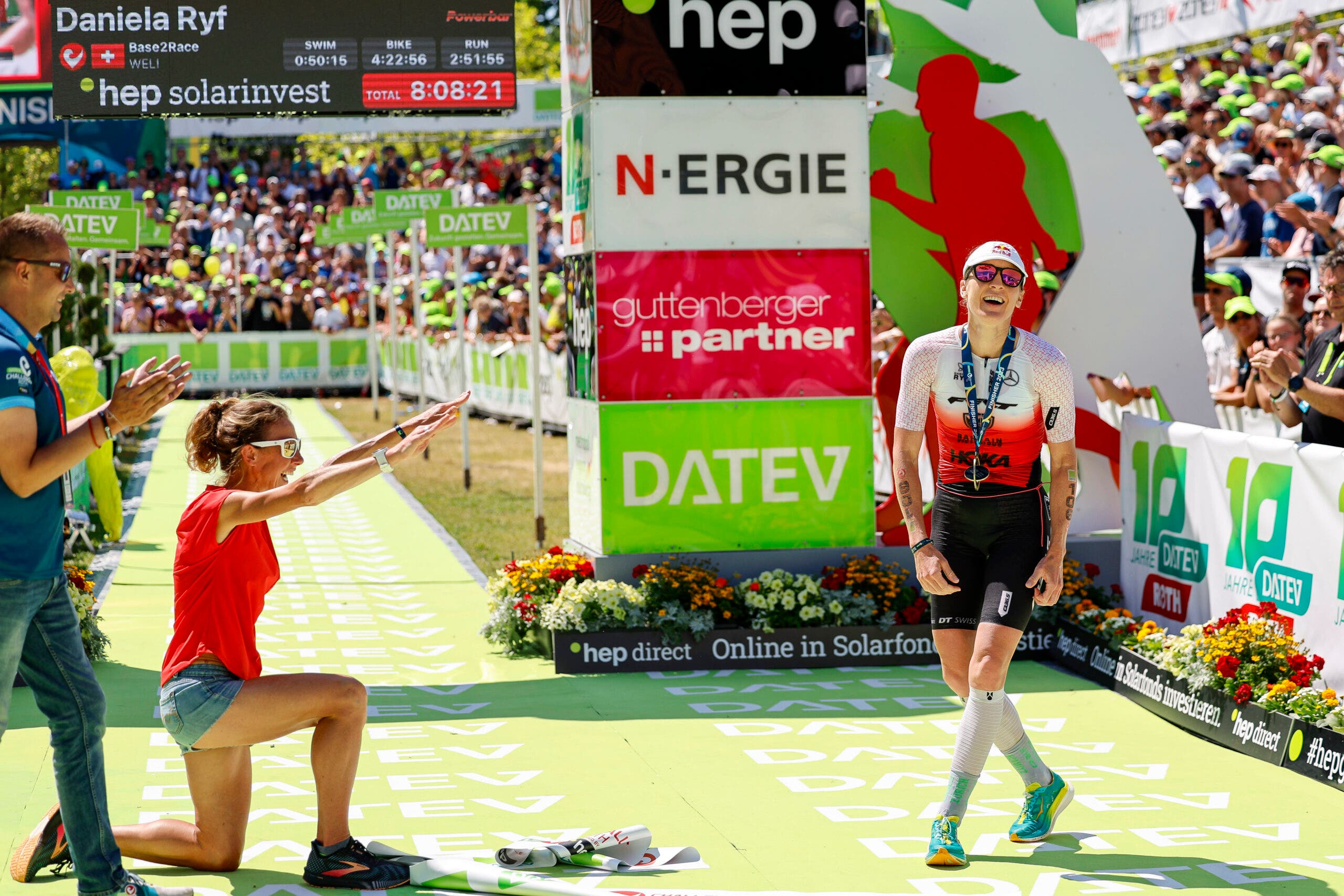Chrissie Wellington: Daniela Ryf is "Greatest Athlete the Sport Has Seen"

Chrissie Wellington (R) and Daniela Ryf are all smiles after Ryf broke Wellington's world record at Challenge Roth 2023. (Photo: Daniel Löb/dpa)
Perhaps more than any other record in our sport, Chrissie Wellington’s much-revered mark of 8:18:13 from Challenge Roth in 2011 was held up as proof that excellence can stand the test of time. Only a few other female pros had come close to Wellington’s record, the nearest and most recent being Laura Philipp’s 8:18:20 in Ironman Hamburg last year. In 2016, Daniela Ryf came within 4 minutes of the record in Roth, and Anne Haug also posted a 8:22 at the same race in 2022.
But despite the drive toward professionalism, the increasing depth of talent in elite racing and – perhaps more than any other factor, the evolution of cutting-edge technology to aid performance – Wellington’s record had been untouchable. That is, until Sunday at Challenge Roth. At that race, Wellington, who retired from iron-distance racing in January 2012 (unbeaten, with a 13-0 record) says her record wasn’t just beaten, it was “obliterated” by Ryf.
Yet for the Brit, it was about far more than Ryf’s solitary performance on a balmy day in Bavaria that impressed. As the two women embraced at the finish, what struck awe into Wellington more than the clock at the finish line reading Ryf’s new world-record time of 8:08:21 was that the Swiss herself has also stood the test of time.
“I think she’s a phenomenon,” Wellington said, having tweeted between race-end and after-party that “The record was never mine to keep. I treasured it, until the time came that it was broken (or rather, obliterated) by the greatest athlete the sport has seen.”
“We hear the term ‘GOAT’ [an acronym for greatest of all time] said a lot,” Wellington tells Triathlete, “But it relates to Daniela’s versatility and strength and resilience across all distances. By her own admission, she’ll have races that don’t go according to plan or to her potential, but to repeatedly be able to learn and grow and come back… that’s as much a marker of a phenomenal athlete as me remaining unbeaten.”
RELATED: Chrissie Wellington Finds “A Different Kind of Satisfaction“
The ultimate package
Ryf’s prowess at long course triathlon needs little introduction. Since turning to the non-drafting side of the sport a decade ago, she has won five Ironman world titles and five Ironman 70.3 world titles among an astonishing 45 middle- and long-distance victories. Neither the best female triathletes nor the poison of the jellyfish could halt her charge. (And yes, the jellyfish tried – we saw that in 2018, when she bounced back from a sting in the swim leg of the Ironman World Championship to take the win and course record, which still stands today.)
Yet Ryf’s World Triathlon career stretches back another decade further, and by the time she finished with short course racing, Ryf was a veteran of two Olympic Games, including a seventh place finish in Beijing in 2008, the year she also won the under-23 world title. It wasn’t always smooth pedaling. While Ryf also managed to win a World Series race in South Korea in 2010, she struggled for a few years before making the jump to long-course triathlon.
“That tenacity and willingness to grow and learn is admirable,” Wellington says. “And the versatility to be racing at Olympic distance and then being able to compete at the half and full distance make her the ultimate package.”
RELATED: Recalled: Daniela Ryf’s Very First Kona Win
Wellington vs. Ryf: Who would win?

While drawing comparisons between the era-defining performances in Roth could be a fool’s errand given the varying factors including an altered run course, for the record, Ryf swam 50:15, biked 4:22:56 and ran 2:51:55 in 2023; in 2011, Wellington swam 49:49, cycled 4:40:39 and ran 2:44:35.
It’s the 18-minute improvement on the 112-mile bike leg (25.6 MPH vs. 24 MPH) that jumps out. Ryf said after taking the tape that to keep pushing during the marathon, she pictured Chrissie chasing her. As good a motivation as that might have been, if the races were truly transposed, she’d have had a 3-mile head-start on the run. Even Chrissie in her pomp, with 50mm stack height supershoes, wasn’t running that down.
“I’m really proud to have held the record, and I didn’t expect to hold it as long as I did,” Wellington adds. “That was my best performance, me at my best, and I can hold tight to that memory of that performance, even though the record has not just been broken but obliterated. I saw the growing talent in the female field and assumed it would be broken long before. Also, with the constant evolution of technological development in the sport, it was inevitable. I came here assuming that this would be the day that it would go.”
I saw the growing talent in the female field and assumed it would be broken long before. Also, with the constant evolution of technological development in the sport, it was inevitable.
And so it came to pass that Daniela Ryf claimed the fastest-ever time recorded by a woman in a full iron-distance race. But beating the record by a full 10 minutes, when it had held for more than decade? For all the caliber of Ryf as an athlete, surely that must have come as a surprise to Wellington.
“I think that when a record has been held for as long as it was, we expect smaller, incremental improvements. With all respect to the athletes racing, I didn’t expect that. It’s maybe my naivety and not realizing the stepchange that’s occurred on the bike at the iron distance.”
If we see similar times in the future though, it won’t come as so much of a shock, not even if they come from someone other than Ryf. The women at the top end of the sport, whether Anne Haug, Laura Philipp, Lucy Charles-Barclay, or Chelsea Sodaro, are going from strength to strength.
“They’re physically strong, mentally resilient, technically advanced and strategically savvy, and that’s what you need to be a really successful full distance athlete,” Wellington says. “And it’s not just one or two women who have those strengths. I could have picked a winner from six girls yesterday, and for the future of this sport, that’s really exciting.”